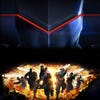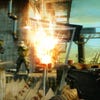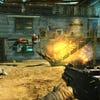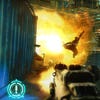Bodycount
Surprisingly low.
Worst of all, they can see through walls. At least, that's the only explanation for the deadly-accurate fire that traces you through buildings. If you die in Bodycount, it's always because you're just walking forwards trying to end it all - stay safe and take it slow, and these clowns will never once get the better of you. Except if you try to melee them. The farce of Bodycount's combat is complete with a useless, disembodied knife swipe that's more of a flail, usually followed by the ignominy of being downed by an enemy using the same animation. It's one of the worst melees ever.
But although Bodycount's enemy AI is remarkably poor, the strange thing is that the levels are clearly designed for something better. This is a linear shooter, but its major environments are multi-levelled and expansive - the kind of place that would be perfect for, say, a ruck with the Covenant.
But the potential of enemy troops like the medic - who revives dead troops as stronger zombie versions - and scavenger, who hoovers up all of your rewards and runs away like the goblin from Golden Axe, is never realised on these clumsy battlefields. Whatever the aspirations were, the hugely disappointing group dynamic of Bodycount's enemies make its better ideas no more than footnotes.
Points are awarded for 'skillshots', but these are unimaginative to the extreme: headshots, explosive kills, kills through cover, and variants thereof. Chaining them together is the route to a big level score, but the elephant in the room is Bulletstorm. People Can Fly's recent FPS not only does the same trick in a much more mechanically accomplished fashion, but has so much more flair, imagination and fun about it.
The skillshot feature, like so much else of Bodycount, feels like it's going through the motions. Getting major scores doesn't reward you with anything other than a global leaderboard, and in the days when games are drowning us in more stats and persistence than ever before, Bodycount has almost nothing. Even the multiplayer, the one area you'd expect to find some kind of avatar to tinker with, is absolutely bare bones in its presentation.
Needless to say, multiplayer is a truly stillborn effort. Including only Deathmatch and Team Deathmatch modes, along with a small clutch of maps, two teams duke it out to be first to 50 kills.
The presence of 'intel' after killing enemies, which is used to charge up special moves, adds a nice coda to the usual deathmatch exchange - the victor has to claim part of their spoils - and the destruction plays much more of a noticeable role than in single-player, so by the end of most maps the key buildings look like Swiss cheese.
Those are two decent ideas in a sea of mediocrity, however, and sometimes even worse. The respawning is especially terrible, and needless to say even early players have worked out where to camp out for easy kills. Among the many crazy things about Bodycount is that its influences are clear and yet not a single one of its features can compete with what other games have been doing as a matter of course for many years.
You begin to think that behind Bodycount there is perhaps the story of an heroic development team tasked with doing far too much with far too little, who have performed a minor miracle in simply shipping something that works. Well, works some of the time. It's an explanation. But the killer fact about Bodycount is that it's nowhere near good enough to compete in the FPS arena, and serves nobody - player, developer or publisher.





















